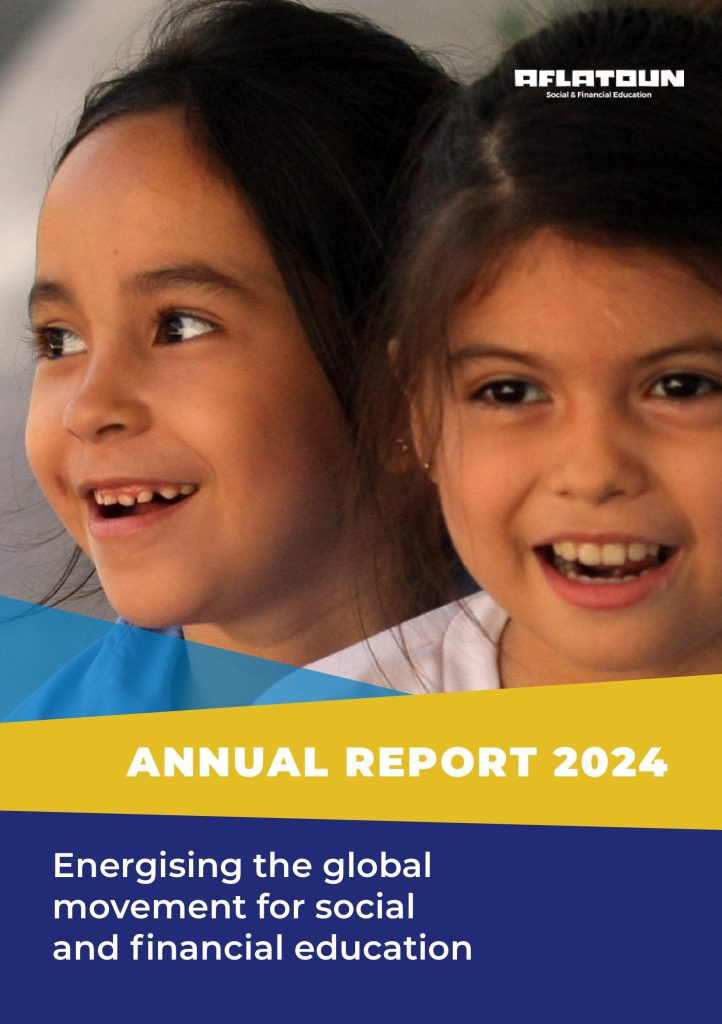From shells and barter to coins, cash, cards, and mobile money – the way we pay keeps changing. What doesn’t change is the value of saving.
As we celebrate World Savings Day, we reflect on how money has evolved throughout history, yet the fundamental principles of financial literacy remain as crucial as ever. At Aflatoun International, we believe that every child and young person deserves the knowledge and skills to navigate an increasingly complex financial world.
Teaching money that moves
Money is no longer a static concept that sits in a piggy bank. It flows through digital wallets, crosses borders in seconds, and takes forms our grandparents could never have imagined. Yet beneath all this technological transformation, the core questions remain the same:
What is money?
How does it move?
And most importantly, how do we make informed choices about earning, spending, and saving?
Through our social and financial education programmes, children and youth around the world are learning to answer these questions. We don’t just teach them about money in theory – we immerse them in practical, student-centered lessons where they actively engage with financial concepts that affect their daily lives.
Building Skills for Life
Our approach goes beyond simple arithmetic. Through active learning methods, children and young people practice setting goals, keeping budgets, and planning for their futures. They learn that saving isn’t just about setting money aside – it’s about having agency over their lives and the power to make their dreams a reality.
Across 100+ countries, reaching over 45 million children and young people, the Aflatoun network is proving that social and financial education creates lasting change. Our programmes adapt to local contexts while maintaining core principles: empowering children to understand their rights, manage resources responsibly, and become agents of change in their own lives.
From early years to young adulthood
We recognise that financial literacy must begin early and evolve with each life stage:
- AflaTot (ages 3-6) introduces the youngest learners to the building blocks of social and financial literacy through play and meaningful activities, creating positive associations with sharing, managing resources, and saving.
- AflaToun (ages 6-14) nurtures curiosity about children’s rights, saving, and entrepreneurship. Through children’s clubs, young people collaborate, manage savings, and undertake small business and community projects.
- AflaTeen (ages 15-18) challenges adolescents to explore their identity while developing essential skills in financial literacy, gender equality, digital skills, and green entrepreneurship.
- AflaYouth (ages 16-24) supports the critical transition to adulthood, focusing on employability, entrepreneurship, and navigating economic challenges in an uncertain world.
More than numbers: empowerment through education
Our research demonstrates that social and financial education creates ripple effects far beyond the classroom. Studies across 52 countries show positive impacts on self-efficacy, critical thinking, and decision-making skills. Children learn to understand money not as an end in itself, but as a tool for creating the lives they want to live.
When children learn about budgeting, they’re also learning about prioritising and making trade-offs. When they practice saving, they’re building discipline and delayed gratification. When they explore entrepreneurship, they’re developing creativity and problem-solving skills. These are life skills that transcend any particular financial system or technology.
A global movement for change
Our work thrives through a dynamic network of NGOs, governments, and educators committed to transforming education. During the 2023 Global Social & Financial Skills Conference, Aflatoun spearheaded the Utrecht Declaration and Commitment to Action, signed by over 200 organisations from over 80 countries. This declaration underscores our collective commitment to ensure access to financial education for all children and youth worldwide.
This isn’t just about individual empowerment – it’s about building a more equitable world. When children understand how money works, when they learn to save with purpose and invest in their futures, they break cycles of poverty and inequality. They transform from passive recipients to active participants in their economic lives.
Join The Movement – this World Savings Day!
On this World Savings Day, we invite you to be part of our movement. Whether you’re a teacher, parent, community leader, or simply someone who believes in the power of education, there are ways to get involved.
Watch our short video here tracing the evolution of money and use it to spark conversations in your classroom or community. Discuss not just how money has changed, but how the principles of wise financial management remain constant.
And try one small action today:
- Set a financial goal, no matter how modest
- Track one day’s expenses to understand where your money goes
- Put aside your first coin in a savings jar
These small steps mirror the approach we teach millions of children worldwide: that financial literacy isn’t about grand gestures, but consistent, informed choices that add up over time.
From dependence to independence
Money will continue to evolve. Tomorrow’s children might use forms of payment we can’t yet imagine. But the ability to understand value, to make informed decisions, to plan for the future, and to save with purpose – these skills are timeless.
At Aflatoun International, we’re committed to ensuring that every child, regardless of their background, has access to these essential skills. Because when children learn to manage money wisely, they’re not just securing their own futures – they’re building a more equitable, empowered, and hopeful world for all of us.
This World Savings Day, let’s celebrate the timeless value of saving and the transformative power of financial education!












